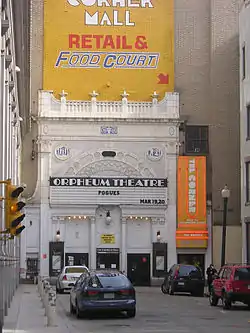Orpheum Theatre (Boston)
The Orpheum Theatre is a music venue located at 1 Hamilton Place in Boston, Massachusetts. One of the oldest theaters in the United States as designed by Snell and Gregerson, it was built in 1852 and was originally known as the Boston Music Hall. It was the founding location of the New England Conservatory of Music in 1867 and it was the original home of the Boston Symphony Orchestra from its founding in 1880. The concert hall was converted for use as a vaudeville theater in 1900. It was renamed the Orpheum Theatre in 1906. In 1915, the Orpheum was acquired by Loew's Theatres and substantially rebuilt. It operates as a mixed-use hall, primarily for live music concerts.
Boston Music Hall, Empire Theatre, Aquarius | |
 | |
| Address | 1 Hamilton Place Boston, Massachusetts |
|---|---|
| Coordinates | 42°21′22.4″N 71°3′39″W |
| Owner | The Druker Company, Ltd. |
| Operator | Crossroads Presents |
| Type | Music venue |
| Capacity | 2,700 |
| Opened | 1852 |
| Website | |
| www | |
The theater has no connection with Boston's Music Hall, currently known as the Wang Theatre.
History
When the Boston Symphony moved to Symphony Hall in 1900, the Boston Music Hall closed. It was converted in 1900, to design by Little and Browne, for use as a vaudeville theater and operated under a number of different names, including the Music Hall and the Empire Theatre. The original E. F Wacker organ was removed in that renovation and rehoused in the purpose-built Methuen Memorial Music Hall by 1909. In 1906, it was renamed the Orpheum Theatre. In 1915, the theater was acquired by the Loew's Theatres. Loew's reopened the Orpheum in 1916 with a completely new interior designed by architect Thomas W. Lamb.
Operated by Loew's, the theater was at first a combination vaudeville and movie theater and later a straight first-run movie house. The Orpheum closed as a movie theatre on January 31, 1971 and reopened as the Aquarius, a live concert hall, on May 27, 1971. The first featured performer was James Brown. The new owner was an African-American business owner and activist named Arthur Scott.[1]
From June 1971 to June 1978, the Orpheum served as the home of the Opera Company of Boston, under director Sarah Caldwell, until that company moved to the current Boston Opera House. It was the site of several significant American premiers including: Berlioz "Les Troyens" (1972), Verdi "Don Carlos" in the original 5 act French version (1973), Prokofiev "War and Peace" (1975), Berlioz "Benvenuto Cellini" (1975), Sessions "Montezuma" (1976), Glinka "Ruslan and Ludmila" (1977), and the first major American production of Verdi "Stiffelio" (1978). During that period America's most popular diva, Beverly Sills, made annual appearances, performing: Norma, La Traviata, Daughter of the Regiment, Barber of Seville, I Capuletti ed i Montecchi, Rigoletto, and Don Pasquale.
The first half of The Police's 1995 double album Live! was recorded at the Orpheum on November 27, 1979. U2's performance at the theater in 1983 was recorded and broadcast on The King Biscuit Flower Hour. In 1984, the original lineup of Aerosmith reformed with a performance at the Orpheum.[2] Tin Machine recorded a portion of their live album, entitled Tin Machine Live: Oy Vey, Baby, at the theater on November 20, 1991. Portions of the March 3–4, 1992 shows at the Orpheum by the Allman Brothers, were used on their 1992 live CD An Evening with the Allman Brothers Band: First Set and the cover photo was taken in front of the venue's marquee.
Currently, the theater is owned by The Druker Company, Ltd. The contract to operate the Orpheum was acquired by Don Law, a Boston concert promoter, from the Live Nation entertainment company, in 2009. Law announced a major renovation for the theater, after which it reopened in late 2009.[3] Live Nation retains a stake in the operations of Law's company, Crossroads Presents.[4][5][6]
The current entrance to the theater is the former alley entrance, replacing the original entrance on Washington Street,[7] which was converted into retail space.
Image gallery
 The Dresden Dolls, 2006
The Dresden Dolls, 2006 Interior, 2008
Interior, 2008 The Decemberists, 2008
The Decemberists, 2008
See also
- Boston Music Hall, predecessor to the Orpheum (1852–1900)
- House of Blues
External links
- Orpheum Theatre website
- Orpheum Theatre at Cinema Treasures
- "Orpheum Theater," BOS.1769, Massachusetts Cultural Resources Information System (MACRIS)
References
- "Sold for a song". May 8, 2019. Retrieved January 26, 2022.
- "Orpheum Theatre in Boston, MA". Cinematreasures.org. Retrieved 2012-05-28.
- Goodison, Donna (May 6, 2009). "Live Nation sells halls". Boston Herald. Retrieved 2015-05-18.
- "Law to put his stamp on House of Blues - The Boston Globe". Boston.com. 2011-02-26. Retrieved 2015-05-18.
- "Live Nation selling Boston theaters - Boston Business Journal". Bizjournals.com. 2009-05-05. Retrieved 2015-05-18.
- "LIVE NATION ENTERTAINMENT, INC. : Annual Report 2012" (PDF). Phx.corporate-ir.net. Retrieved 2015-05-18.
- Verse Media. "About Orpheum Theatre - Boston Events, Boston Music, Boston Concerts". Crossroadspresents.com. Archived from the original on 2013-08-30. Retrieved 2015-05-18.